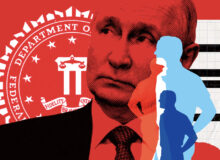Orientals” were not the only ethnic group whom FDR viewed with automatic suspicion. He harbored similar sentiments concerning Jews. There are more than a dozen documented instances in which Roosevelt made unflattering statements about Jews in private conversations with friends or political allies in the 1930s and 1940s.
His remarks about Jews focused on several specific themes: that Jews possessed certain innate and distasteful characteristics; that it was undesirable to have too many Jews in any single profession, institution, or geographic locale; and that America should be an overwhelmingly white and Protestant country.
Thus, President Roosevelt accused the publishers of the New York Times of using “a dirty Jewish trick” to resolve a tax problem. He told Rabbi Stephen S. Wise, America’s foremost Jewish leader, that Jews in Poland were to blame for provoking antisemitism because they dominated the Polish economy. In a conversation with Sen. Burton Wheeler (D-MT), Roosevelt expressed pride that “there is no Jewish blood in our veins.”
In one 1941 cabinet meeting, FDR remarked that there were too many Jews among federal employees in Oregon. He also boasted that when he was on Harvard University’s Board of Overseers in the 1920s, he had helped bring about a quota to limit the admission of Jewish students. In 1943, he privately asserted that German hostility toward Jews was “understandable” because (he erroneously claimed) “over fifty percent of the lawyers, doctors, school teachers, college professors, etc., in Germany, were Jews.”
Most relevant to the issue of the Japanese internment was what Roosevelt said about Jews to Winston Churchill during a White House luncheon on May 22, 1943. According to the diary of Vice President Henry Wallace, FDR approvingly described a plan drafted by one of his advisers, which “essentially [was] to spread the Jews thin all over the world. The president said he had tried this out in [Meriwether] County, Georgia, and at Hyde Park to add four or five Jewish families at each place. He claimed that the local population would have no objection if there were no more than that.”
FDR’s plan for the Jews was remarkably similar to what he envisioned for Japanese Americans. At a November 21, 1944, press conference, the president explained what would happen to the detainees after leaving the internment camps:
“A good deal of progress has been made in scattering them through the country…whether it’s in the Hudson River Valley or in western Georgia which we all know, in one of those countries, probably half a dozen or a dozen families could be scattered around on the farms and worked into the community….And they wouldn’t—what’s my favorite word?—discombobulate the existing population of those particular countries very much.”
This common theme underlay Roosevelt’s perceptions of both Jews and Japanese Americans. Their “blood”—that is, their innate racial characteristics—made them suspect. If admitted to the United States in large numbers, they would overcrowd certain professions, dominate aspects of society, or harm America’s character or culture in other ways. They needed to be “spread out thin” to keep them in check. The entry of significant numbers of “non-assimilable” Jewish or Asian immigrants did not fit that vision.
That explains why the Roosevelt administration suppressed Jewish refugee immigration far below the levels allowed by the existing quota system. Some 190,000 quota places from Germany and Axis-occupied countries went unused from 1933 to 1945. Yet the president turned away the refugee ship St. Louis with its 930 Jewish passengers and refused to support a bill to admit 20,000 refugee children from Germany. Even though permitted by the existing quota laws, taking in any significant number of Jewish refugees did not comport with Franklin Roosevelt’s conception of ideal America.
That meant losing almost all their possessions and being shipped off to detention camps for years for Japanese-Americans. For Jews trying to flee from Europe, it meant America slammed shut its doors just at the moment when they most desperately needed shelter.
Dr. Medoff is founding director of The David S. Wyman Institute for Holocaust Studies and author of more than 20 books about Jewish history and the Holocaust. His most recent book, The Jews Should Keep Quiet: Franklin D. Roosevelt, Rabbi Stephen S. Wise, and the Holocaust is published by the Jewish Publication Society of America / University of Nebraska Press. And available at Amazon.
FDR’s Japanese Problem, FDR’s Japanese Problem, FDR’s Japanese Problem






